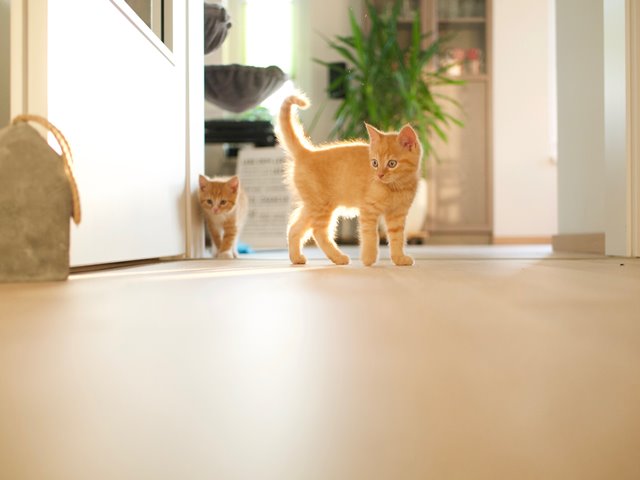Common cat hazards
As all cat owners know, cats are curious and playful animals. However, as per the old saying, this same curiosity can often get them into trouble! Take a look as we cover some common hazards that can be found at home, and offer suggestions to prevent problems arising. Poisons/Toxins Many people think of dogs as […]
As all cat owners know, cats are curious and playful animals. However, as per the old saying, this same curiosity can often get them into trouble! Take a look as we cover some common hazards that can be found at home, and offer suggestions to prevent problems arising.
Poisons/Toxins
Many people think of dogs as the most likely scavengers, and so mistakenly assume that cats are less vulnerable to being poisoned by eating something they shouldn’t. However, cats are naturally curious and are often meticulous groomers, meaning that any harmful substance that gets on their fur is also likely to be ingested. Moreover, cats lack certain liver enzymes, leaving them unable to metabolise some chemicals and making them particularly sensitive to drugs and toxins. Here we’ll discuss some common household substances that can be poisonous to cats:
Plants
Many common houseplants including tulips, foxglove and hydrangeas are toxic to cats. Lilies are among the most harmful, and even small amounts can result in severe and potentially irreversible kidney damage. If you have cats then it’s best to avoid these plants, or at least make sure that they are kept well out of reach of your feline friends (though this is often easier said than done!). It’s wise to be aware of which house- and garden plants can pose a risk to your cat.
Medications
Their inability to metabolise certain toxic substances means that medications that are considered very safe for human beings can be deadly to cats, even in very small doses. Notably, paracetamol, aspirin and ibuprofen are all toxic to cats and should never be given. This problem isn’t restricted to pharmaceutical products, as even some human vitamins or supplements can be dangerous (in particular products containing iron, zinc, vitamin A or vitamin D).
Finally, it’s not only human drugs and supplements that can be hazardous to cats. Many veterinary products are designed to be highly palatable to make them easier to give, but this can mean that if our cats get hold of them they’ll often ingest large doses which may be harmful. NSAIDs (anti-inflammatory drugs commonly used for arthritis) are a good example, as the veterinary versions of these are often sweet tasting and can cause serious GI, liver and kidney problems if taken in high doses. Care should also be taken when purchasing flea and worm treatment from pet shops, and products designed for dogs should never be used in cats, as some contain a substance called permethrin which is highly toxic to cats.
To avoid these problems, never give your cat any medication without first consulting your vet (no matter what that person on the internet told you!). We’d suggest always purchasing the flea and worm treatment recommended by your vet, or, ifpurchasing it from one of the larger pet stores, seeking the advice of one of the ‘Suitably Qualified Persons’ (SQP) who work there. Lastly, keep all medications (no matter how innocuous they may seem!) in a safe place that your cat can’t access.

Other household chemicals
Many other chemicals commonly found in the home can also pose a threat to cats. This includes, but is not limited to:
- Insecticides and rodenticides (bug killer and rat poison)
- Garden products such as fertilizers, weed killer, and slug pellets
- Antifreeze (particularly tempting given its sweet taste!)
- Bleach and other cleaners
- Paint, paint thinner and turpentine
Be sure to keep these products out of reach of your cat, and be sure to lock your cat away whenever you’re using them, as even the fumes from some of these products can be harmful!
Human foods
Lastly, even foods that are perfectly safe for us can be harmful to your cat. Grapes and raisins, sultanas and currants, onions and garlic, and even chocolate are all poisonous to cats. Moreover, look out for products containing an artificial sweeter called xylitol (including some types of peanut butter, and chewing gum) which can also be extremely dangerous. Lastly, although most cats like fish and meat, it’s not advisable to give either of these foods with bones in. The bones can get stuck in the mouth or throat; or worse, in the intestines where they can cause life-threatening obstructions.
Never feed your cat any of these foods (it’s best to avoid most human foods altogether), and don’t leave them out in the kitchen or on the dinner table where they might be able to sneak a mouthful!
What to do if your cat has ingested something toxic
If you think your cat has ingested any of the above substances (or anything else you may be concerned about) then don’t panic. The first step should always be to contact your vet (or if your vet is closed then you can find details of an emergency vet close to you online). Don’t induce vomiting unless advised to do so by your vet, as some substances may cause more damage on the way out if your cat brings them up! The seriousness of the problem will depend on the exact substance they’ve eaten, the amount they’ve ingested, and the size and age of the animal and your vet will be able to advise you on how best to proceed.

Other Common Hazards
It’s not just poisons and toxins that pose a threat to cats, and in fact, various other dangers can be present around the house:
Strings and threads
Many owners will know how much cats love playing with a ball of wool or a mouse on a string. However, anything long and string-like can be hazardous to cats, as they may get caught in the mouth or throat and cause irritation. Even worse, if they are swallowed they can cause part of the intestine to telescope into itself (known as an intussusception), or act like a cheese-wire and cut through the bowel. Many common household items carry these risks including tinsel, thread, dental floss, rubber bands and hair ties. Be careful to store these items where your cat can’t get hold of them, and if you use toys made of string then be sure to put them away when playtime is over.
Cables and wires
Much like a piece of string, a stray cable can also appear as a fun plaything for your cat. Unfortunately cables carry electrical currents, and your cat risks being electrocuted if they chew through the outer coating and touch the metal wire inside. Use cord protectors to protect your wires and cables, and keep them out of reach of cats.
Falls from windows or balconies
It’s commonly said that cats always land on their feet, and while it may be true that they’re often particularly adept gymnasts, this will do little to help them if they fall from a great height. If your house has any windows or balconies at a height of more than a few metres then be sure to make them safe with window screens or wire mesh; and if this isn’t possible then keep cats away from them!
Neighbours’ sheds, garages and car engines
As we mentioned earlier, cats are naturally very curious animals with a drive to investigate and explore their surroundings. Unfortunately, this leads to the very common phenomenon of cats getting locked away (unintentionally) in a neighbour’s shed or garage. Once stuck in a place like this, cats can very quickly become dehydrated, and liver damage can also occur very rapidly if they go without food for any significant amount of time. If your cat goes missing, be sure to check these areas immediately. Wherever they get to, a microchip will enhance your chances of being reunited with your cat*, and some owners even use a GPS tracking device for cats that are particularly prone to straying.
Some cats will also tend to explore more dangerous areas. The warmth of a car engine can be particularly appealing in the winter, and there have even been reports of cats climbing into washing machines! Be sure to knock on your car bonnet before starting the car in the colder months, and always check your household appliances before switching them on!
*Kittens must be microchipped by 20 weeks of age.
Traffic accidents
Lastly, despite our best efforts, road traffic accidents (or RTAs) are one of the biggest killers of cats in the UK. Ideally, cats wouldn’t live in houses on busy roads, and should be kept in at night, where possible, (a tasty meal at night-time often brings them back home!) If this isn’t manageable, a reflective collar will help them to be more visible to drivers, and neutering will reduce their tendency to roam so far.
While this might all sound a bit scary, these problems are still rare, and most cats will never experience an accident at home! However, hopefully, this article has pointed out a few hazards you might not have thought of, and provided some ideas to help keep your feline friends as safe as possible!
 Pet Owner
Pet Owner 



